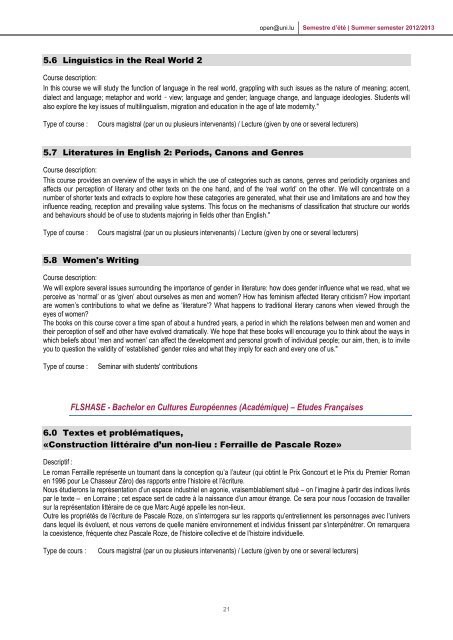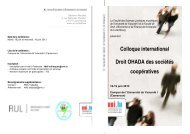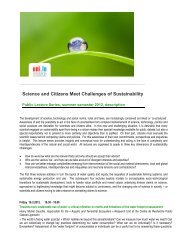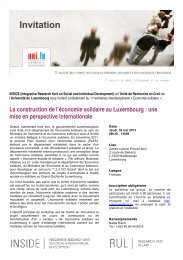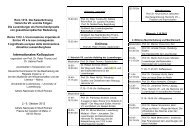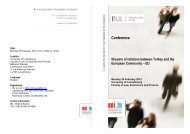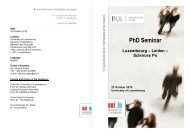2. June 2013 - Université du Luxembourg
2. June 2013 - Université du Luxembourg
2. June 2013 - Université du Luxembourg
Create successful ePaper yourself
Turn your PDF publications into a flip-book with our unique Google optimized e-Paper software.
5.6 Linguistics in the Real World 2<br />
21<br />
open@uni.lu Semestre d’été | Summer semester 2012/<strong>2013</strong><br />
Course description:<br />
In this course we will study the function of language in the real world, grappling with such issues as the nature of meaning; accent,<br />
dialect and language; metaphor and world‐view; language and gender; language change, and language ideologies. Students will<br />
also explore the key issues of multilingualism, migration and e<strong>du</strong>cation in the age of late modernity."<br />
Type of course : Cours magistral (par un ou plusieurs intervenants) / Lecture (given by one or several lecturers)<br />
5.7 Literatures in English 2: Periods, Canons and Genres<br />
Course description:<br />
This course provides an overview of the ways in which the use of categories such as canons, genres and periodicity organises and<br />
affects our perception of literary and other texts on the one hand, and of the ‘real world’ on the other. We will concentrate on a<br />
number of shorter texts and extracts to explore how these categories are generated, what their use and limitations are and how they<br />
influence reading, reception and prevailing value systems. This focus on the mechanisms of classification that structure our worlds<br />
and behaviours should be of use to students majoring in fields other than English."<br />
Type of course : Cours magistral (par un ou plusieurs intervenants) / Lecture (given by one or several lecturers)<br />
5.8 Women's Writing<br />
Course description:<br />
We will explore several issues surrounding the importance of gender in literature: how does gender influence what we read, what we<br />
perceive as ‘normal’ or as ‘given’ about ourselves as men and women? How has feminism affected literary criticism? How important<br />
are women’s contributions to what we define as ‘literature’? What happens to traditional literary canons when viewed through the<br />
eyes of women?<br />
The books on this course cover a time span of about a hundred years, a period in which the relations between men and women and<br />
their perception of self and other have evolved dramatically. We hope that these books will encourage you to think about the ways in<br />
which beliefs about ‘men and women’ can affect the development and personal growth of indivi<strong>du</strong>al people; our aim, then, is to invite<br />
you to question the validity of ‘established’ gender roles and what they imply for each and every one of us."<br />
Type of course : Seminar with students' contributions<br />
FLSHASE - Bachelor en Cultures Européennes (Académique) – Etudes Françaises<br />
6.0 Textes et problématiques,<br />
«Construction littéraire d’un non-lieu : Ferraille de Pascale Roze»<br />
Descriptif :<br />
Le roman Ferraille représente un tournant dans la conception qu’a l’auteur (qui obtint le Prix Goncourt et le Prix <strong>du</strong> Premier Roman<br />
en 1996 pour Le Chasseur Zéro) des rapports entre l’histoire et l’écriture.<br />
Nous étudierons la représentation d’un espace in<strong>du</strong>striel en agonie, vraisemblablement situé – on l’imagine à partir des indices livrés<br />
par le texte – en Lorraine ; cet espace sert de cadre à la naissance d’un amour étrange. Ce sera pour nous l’occasion de travailler<br />
sur la représentation littéraire de ce que Marc Augé appelle les non-lieux.<br />
Outre les propriétés de l’écriture de Pascale Roze, on s’interrogera sur les rapports qu’entretiennent les personnages avec l’univers<br />
dans lequel ils évoluent, et nous verrons de quelle manière environnement et indivi<strong>du</strong>s finissent par s’interpénétrer. On remarquera<br />
la coexistence, fréquente chez Pascale Roze, de l’histoire collective et de l’histoire indivi<strong>du</strong>elle.<br />
Type de cours : Cours magistral (par un ou plusieurs intervenants) / Lecture (given by one or several lecturers)


